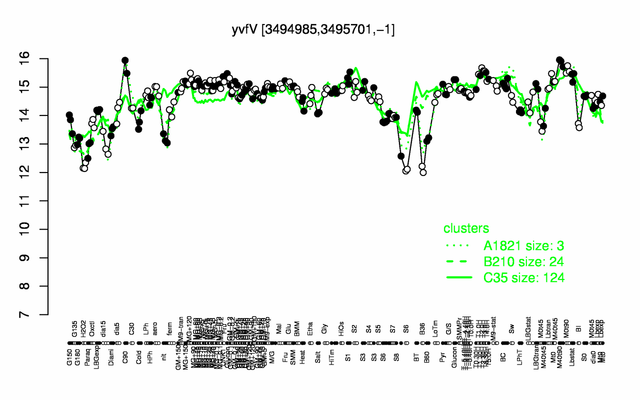Difference between revisions of "LutA"
(→Biological materials) |
(→Biological materials) |
||
| Line 136: | Line 136: | ||
* '''Expression vector:''' | * '''Expression vector:''' | ||
| − | * '''lacZ fusion:''' amyE::P(lutA-lacZ cat) [[pAC5]] | + | * '''lacZ fusion:''' amyE::P(lutA-lacZ cat) [[(pAC5)]] |
* '''GFP fusion:''' | * '''GFP fusion:''' | ||
Revision as of 08:49, 28 January 2014
- Description: lactate catabolic enzyme
| Gene name | lutA |
| Synonyms | yvfV |
| Essential | no |
| Product | lactate oxidase |
| Function | lactate utilization |
| Gene expression levels in SubtiExpress: lutA | |
| Metabolic function and regulation of this protein in SubtiPathways: lutA | |
| MW, pI | 26 kDa, 6.25 |
| Gene length, protein length | 714 bp, 238 aa |
| Immediate neighbours | lutB, yvfU |
| Sequences | Protein DNA DNA_with_flanks |
Genetic context 
This image was kindly provided by SubtiList
| |
Expression at a glance PubMed
| |
Contents
Categories containing this gene/protein
utilization of specific carbon sources
This gene is a member of the following regulons
FbpB regulon, FsrA regulon, LutR regulon, SinR regulon
The gene
Basic information
- Locus tag: BSU34050
Phenotypes of a mutant
no growth with lactate as the single carbon source PubMed
Database entries
- DBTBS entry: no entry
- SubtiList entry: [1]
Additional information
The protein
Basic information/ Evolution
- Catalyzed reaction/ biological activity: oxidation of lactate to pyruvate PubMed
- Protein family:
- Paralogous protein(s):
Extended information on the protein
- Kinetic information:
- Domains:
- Modification:
- Cofactor(s):
- Effectors of protein activity:
Database entries
- Structure:
- UniProt: O07020
- KEGG entry: [2]
- E.C. number:
Additional information
Expression and regulation
- Sigma factor:
- Regulation: induction by lactate PubMed
- Additional information:
Biological materials
- Mutant:
- Expression vector:
- lacZ fusion: amyE::P(lutA-lacZ cat) (pAC5)
- GFP fusion:
- two-hybrid system:
- Antibody:
Labs working on this gene/protein
Richard Losick, Harvard Univ., Cambridge, USA homepage
Your additional remarks
References